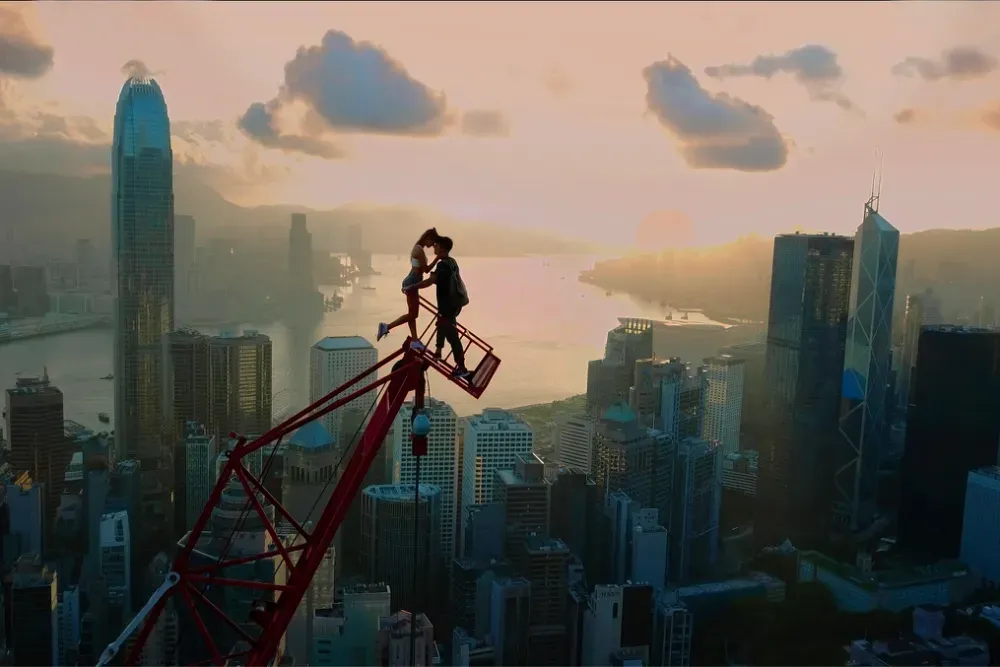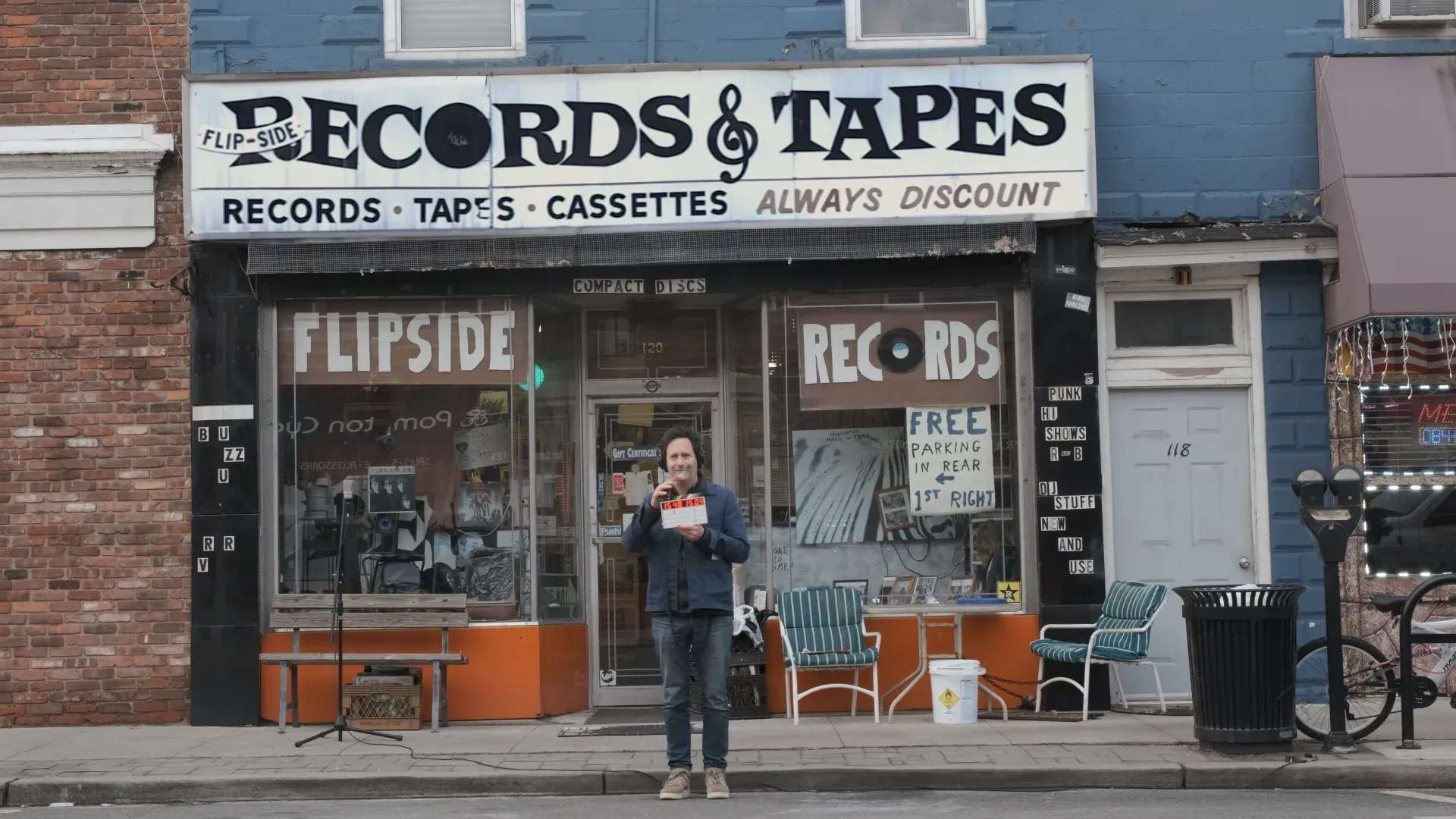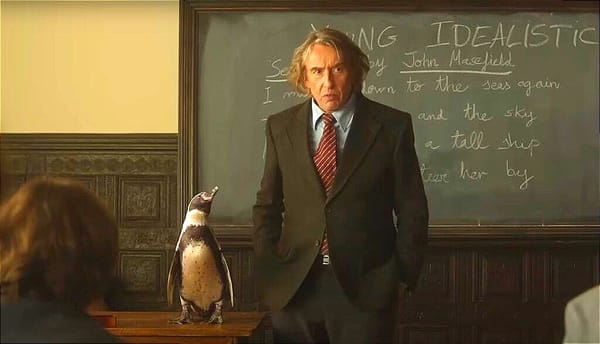What to Watch: "Skywalkers," "Flipside"
Plus: The Watch List turns three! And, for paid subscribers, reviews of "Twisters" and "National Anthem"

We’re coming up on another anniversary of “Ty Burr’s Watch List” – it’s been three years since I took a swan dive from two decades at The Boston Globe into a potentially empty swimming pool – and these birthdays always get me a little antsy at time’s passing. I’m happy to say the pool wasn’t empty – more like half-full and rising slowly – and it turns out there were adjacent pools in the form of reviewing gigs at the Washington Post (see reviews of "Twisters" and "National Anthem" below) and elsewhere. But the Watch List remains my primary source of income and so, as I do every year now after I’ve blown out the candles, I ask you to consider re-upping your subscription if you’re one of the original fellow travelers of this newsletter or – if you’ve been getting the free version in your email inbox – becoming a paid subscriber and supporting not only me in this eclectic journey but the entire idea behind the Watch List: That there’s cinematic gold in them thar streaming hills and someone has to help you mine the good stuff, since the services themselves aren’t remotely interested in curating what they sell you.
I have two excellent new films to recommend this week – both available on VOD and both of them documentaries (and both more entertaining than the majority of fictional narratives out there). But before I get to them, I’d like you to ask yourself: How many movies has this newsletter led you to in the past year or more? I figure if you’ve seen three or four that you might not have seen otherwise, that covers the cost of an annual subscription right there. As the bloom fades from the streaming boom and we run out of binge-worthy shows to watch, the values and pleasures of a good stand-alone film become more apparent. And there are so many available – so many windows onto so many different eye- and heart-opening worlds – that I find it almost a moral duty to point them out, many of them on services you already subscribe to. Maximizing your investment in this often-overwhelming media landscape is one of the ideas that got me to start Ty Burr’s Watch List. Keeping great movies alive is another, because a movie that doesn’t get seen simply ceases to exist.
Beyond that, this is the time of year when I check in with readers and ask you to tell me what’s working and what’s not. What do you want more of? Less of? How do I make the Watch List more useful? How do I make it more fun, more meaningful? Should I start doing podcasts again? Should I take the Watch List to YouTube or (gulp) TikTok? The suggestion box is open in the comments field below, or you can email me at ty@tyburrswatchlist.com. I really do find your thoughts helpful, so bring them on.

Right, the movies. Premiering on Netflix today is “Skywalkers: A Love Story” (⭐ ⭐ ⭐), which I saw at Sundance in January and which deserves your attention unless you’re seriously acrophobic. Jeff Zimbalist’s documentary works as a cross between “Man on Wire” (insane high-wire acts) and “Fire of Love” (devoted couple push the envelope of experience), with a bit of “Free Solo” (you couldn’t pay me to climb that thing). Russian rooftoppers Angela Nikolau and Ivan Beerkus tour the world illegally ascending to the very tippy-top of skyscrapers. In the process they test their relationship and our vertigo. It’s an Instagram-ready love story, and the line between living a romance and performing it gets hazy, but there’s no denying the couple’s outrageous achievements. The movie generally keeps politics out of it, and I’m not sure if that’s a feature or a bug, but the act of unlawfully ascending to the highest point you can find and Instagramming it to the world seems to me both an inherently revolutionary act and symbolic of a desperate need to escape the conditions of one’s life. Of the two, Beerkus is the more pragmatic and Nikolau is the more obsessed with taking nerve-jangling risks – to the point of jeopardizing their relationship – and we’re invited to wonder if the possibility of plummeting to one’s death is preferable to a woman’s lot in modern Russia. Watch it for the spectacle and chew on the dissonances.

Over on Amazon, “Flipside” (⭐ ⭐ ⭐) is ostensibly about a record store, but it’s really a mid-life crisis movie, and often a very funny and moving one that will speak to a lot of people navigating the compromises of adult life. Director Christopher Wilcha was a Gen-X brat who hit it big with 1999’s “The Target Shoots First,” a documentary about his days as a disaffected corporate wage slave. Then he got married, had kids, labored on various projects for Ira Glass and Judd Apatow, started a lot of docs that he never finished, and ultimately became a very successful director of television commercials – exactly the kind of sell-out he’d railed against in his flannelized youth. Seeking to somehow reconnect with that kid, Wilcha went back to the northern New Jersey vinyl shop he’d worked at in high school, now an unnavigable warren of LPs stacked in smoked meat cartons and run by the affable, ageless Dan. “Flipside” observes how the title store is both fossilized in the amber of its ironic generation and gradually being eroded by time, and things get even more complicated when another, spiffier vinyl store opens two blocks, also run by a guy named Dan.
In what has to be considered a radical act of resource recycling, Wilcha weaves in footage from his incomplete documentaries, which offer wisdom from Apatow – there’s a terrific Zoom call where Wilcha’s mother blasts the “40-Year-Old Virgin” director for making her son and grandkids move out west, and Apatow just nods in abashed agreement – Glass, and others.
The great jazz photographer Herman Leonard, 87 and dying from cancer, shares his optimistic philosophy but still finds himself chafing at the clock’s running out: “I think I left something of importance, but never enough. I never shot enough.” “Flipside” skips like a rueful stone from nugget to nugget: Wilcha’s old girlfriend and record-store colleague – she now runs an online vinyl emporium for collectors – telling him, “Oh, honey, you need to let go.” Floyd Vivino, a.k.a. Uncle Floyd, a.k.a. the Dada Soupy Sales of 1980s New Jersey cable TV, stopping by to shop for novelty singles and playing some of his novelty songs. David Bowie, seen in a concert clip singing about Uncle Floyd as a symbol of fame’s revolving Ferris wheel. TV writer/producer David Milch (“NYPD Blue,” “Deadwood”) holding forth on art (“For just a moment you feel whole, and then a wave comes over you and you say “I’m home”) and then late in the film glimpsed in assisted living as he slowly, smilingly disappears behind Alzheimer's Disease, greeting Wilcha as a friendly stranger and acknowledging that his only regret in life are the “failures of generosity.”
So it’s a movie about a record store but also about the track of our days and years, how they wander and where they end. Pieces of abandoned projects quilted into a ruminative, quixotic whole that ends, perfectly, with The Replacements’ eternal “Unsatisfied” over the end credits. I’ve got 10 or 15 years on Wilcha, but “Flipside” spoke to me, and deeply, in its musical obsessions, its sadness and joys and doubts, and in its understanding that we never understand life at all until we realize it’s the living that’s the understanding. It’s good to be reminded of that every so often.
Feel free to leave a comment or add to someone else's.
If you enjoyed this post, please forward it to friends! And if you’re not a paying subscriber and would like to sign up for additional postings and to join the discussions — or just help underwrite this enterprise, for which the author would be eternally grateful — here’s how.
‘Twisters’ blows away the summer competition
Glen Powell stars in a well-crafted action-romance that arrives like a much-needed cool breeze.
Originally published in The Washington Post July 17, 2024

What does anyone want from a summer blockbuster, anyway?
Good-looking stars, some witty banter, characters you can believe in for a couple of hours. Enough of what the MPAA ratings board calls “intense action and peril” to make you feel you got your money’s worth in adrenaline, but not so much that you feel bludgeoned or pandered to. You don’t want it to be too brainy, or too brainless. Half a brain is about right.
The surprise of summer 2024 is that “Twisters” (⭐ ⭐ ⭐ 1/2) checks almost every item on that punch list, which is a lot more than a sequel that no one asked for deserves. Die-hard fans of the original 1996 “Twister” may regret that there are no poorly digitized flying cows this time around — refreshingly, the new film avoids nostalgic shout-outs altogether — but they may be too busy dodging airborne trucks, RVs, trolley cars and a movie screen showing the original 1931 “Frankenstein” to notice.
Where “Twister” was a remarriage story disguised as a disaster film, “Twisters” is largely a rom-com in a wind tunnel. It’s established early that the young meteorologist Kate Carter (Daisy Edgar-Jones) has the same ESP for incoming tornadoes that Bill Paxton had in the first film, which doesn’t prevent tragedy from hitting her team in the field and taking a bunch of fine young actors with it.
Cut to five years later, and Kate is coaxed out of a New York desk job and back to Oklahoma by fellow survivor Javi (Anthony Ramos), who has a new, murkily sponsored radar technology he wants to test out and needs Kate’s nose for wind. One of the changes apparent since 1996 is that the internet and YouTube have created an army of storm-chasing amateur weather “influencers” who get in the professionals’ way, chief among them Tyler Owens (Glen Powell), a preening cowboy who calls himself the “Tornado Wrangler” and has a ragtag crew of hard-living, drone-flying, tattooed misfits.
Kate’s tightly wound, Tyler’s as loose as a goose. It’s the old story, but a good one when the players bring the stuff, and these two do. Edgar-Jones (“Normal People,” “Where the Crawdads Sing”) has a straightforward, intelligent presence that powers her through the mayhem while letting you see Kate’s residual PTSD; she’s not the F5 force of nature Helen Hunt was in the first film, but the part’s not written that way.
Anyway, the microburst here is her co-star. Powell has been getting hyped as the Next Big Thing all year, and for a reason: He is. Anyone who saw Richard Linklater’s “Hit Man” in its theatrical run (it’s still playing on Netflix, watch already) knows it, and while the romantic chemistry in “Twisters” isn’t as off-the-charts as in that film, it’s pleasurable enough, especially when Tyler dials down the arrogance and Kate dials up the expertise. As an actor, Powell combines wit, confidence and decency in ways that feel more welcome than fresh; he’s a little like Chris Evans with sharper reflexes. Can he do heavy drama? I don’t care. He can do this, and superbly.
The supporting players don’t represent as deep a bench of “that guy” energy as the 1996 original, which boasted Philip Seymour Hoffman, Cary Elwes, Todd Field, Alan Ruck and more. But the cast does feature such off-Hollywood talents as Katy O’Brian (“Love Lies Bleeding”), Sasha Lane (“American Honey”), Brandon Perea (“Nope”) and a blessedly sane Maura Tierney as Kate’s mom.
I wish I could tell you more about the plot, but do you really need to know? Blah blah blah science blah blah blah polymers blah blah blah evil real estate villains. What you do need to know: tornadoes on fire. Twenty-eight years of improvements in digital effects have made the meteorological cataclysms in “Twisters” bigger, more detailed and scarier than in the first movie. There’s a nighttime rodeo sequence that becomes a terrifying maelstrom of panic and split-second decision-making, and a ride through an exploding gas refinery that delivers on your most fundamental lizard-brain summer-movie needs.
The difference is that “Twisters” emphasizes the terrible human cost of weather disasters even more than the first film, and there are grace notes of connection in the script by Mark L. Smith and Joseph Kosinski that are brought to life by director Lee Isaac Chung. Chung’s last film was the sweet, handmade Oscar winner “Minari” (2020), and, as is the proper order of events in Hollywood, he has been handed the keys to a megabudget franchise film to see what he can do. Apparently, he can do it all.
“Twisters” isn’t art and doesn’t want to be. Like “Twister,” it’ll never be held up as a classic but will instead be reliably watched for the next 28 years until someone gives us “Twister 3: Maximum Vorticity.”
Provided we’re around, that is. Would it have killed anyone to mention, even in passing, man-made climate change — the reason for the dramatic increase in severe weather both on the screen and in recent reality? Even if director Chung has stated that he didn’t want to insert a lecture into the movie, there’s plenty of room between lecturing and sticking your head in the sand. But I guess the last thing most people want from a summer blockbuster is a reminder of what’s waiting for them when the movie’s over.
PG-13. Contains intense action and peril, some language, and injury images. 122 minutes.
‘National Anthem’: America at its openhearted best
Luke Gilford’s gentle coming-of-age drama offers an appealing alternate vision of the American West.
Originally published in The Washington Post July 18, 2024

Who owns the American flag? All of us, obviously, but some would say it’s been co-opted in recent years by people who love this country for what they think it once was rather than what it still could be. For too many, the flag symbolizes democracy, equality and the freedom to live as one wants for everyone except the people they don’t like. But others would like to have their American flag back, and if that means putting up a rainbow flag next to it to underscore the point, so be it.
What does any of this have to do with a movie review? When the movie is called “National Anthem” (⭐ ⭐ ⭐) a lot. “The Star-Spangled Banner” is sung at the end of Luke Gilford’s gentle coming-of-age story by an impeccably dressed drag queen opening a queer rodeo put on by a local chapter of the 40-year-old International Gay Rodeo Association. Yes, that organization exists. So do these people. It’s their flag, too.
At the center of the film is Dylan (Charlie Plummer), a rawboned 21-year-old living in the Rio Grande Valley south of Albuquerque with a much younger brother, Cassidy (Joey DeLeon), and a mother, Fiona (Robyn Lively), who’s climbed most of the way out of the bottle but not far enough. Dylan gets by on day jobs in construction and digging gravel; he has vague dreams of buying an RV and going … somewhere, but in a real sense, he’s waiting for life to happen.
A gig at a remote ranch introduces the boy to a community of gender-fluid rodeo riders and particularly to Sky (Eve Lindley), who appears to him like Venus on a quarter horse and with whom he’s instantly smitten. Lindley is a model and actress with the charisma of a dangerous gamine — Sky is drawn to Dylan, too, but her main relationship is with the ranch’s owner Pepe (Rene Rosado), and there’s some question of whether she’s just fishing for this season’s plaything.
Gilford, a filmmaker and photographer who grew up in the area and whose father was a professional rodeo rider, establishes the ranch as a warm, inviting community with subterranean tensions, and he lets the attraction between Dylan and Sky build and crest with abandon, augmented by the stray mushroom trip and lit up with all the colors of the American Southwest, captured by cinematographer Katelin Arizmendi with a sunset-bruised fidelity.
The score by Nick Urata, with songs by Perfume Genius, adds to a lazy, powerful current of erotic energy coursing through the film. “National Anthem” is that rarity, a genuinely sensual American movie, and in that sensuality it connects its characters to the transcendence and union promised by Emerson, Whitman, Melville and all the rest of our country’s great literary dreamers.
The storyline? It’s pretty slack, and there are times “National Anthem” opts for mere prettiness when more footage of the rodeo circuit would have grounded the film in a welcome documentary reality. But Plummer — he played the homeless teen who befriends a horse in the touching, little-seen “Lean on Pete” (2018) — has a natural gravitas that brings to mind classic western figures, which makes Dylan’s accepting of and acceptance into the ranch community charmingly subversive. Especially when he dons drag for a karaoke rendition of Melissa Etheridge’s “The Only One,” and a Dylan who has been buried far beneath the surface suddenly, ebulliently bursts free.
A subplot in which Dylan brings his little brother to the ranch after their mother relapses is there to signal the open-mindedness of the coming generation, but it feels forced. “Are you a boy or a girl?” Cassidy asks Carrie (Mason Alexander Park), a drag queen who has become Dylan’s confidant and protector. “Both,” Carrie replies. “Cool,” says Cassidy. That howling you hear is the sound of Moms for Liberty in full bay.
Similarly, the character of the mother gets a Big Speech toward the end that Lively almost manages to lift off the page into life. For Gilford’s debut feature, it’s still a good start. “National Anthem” is at its openhearted, poetically inclined best when observing an alternate vision of the American West that’s no less possible for being radical (and no less radical for being possible) — where the rugged individual is downplayed in favor of the supportive extended family, where the reinvention promised by the frontier embraces gender and sexuality, and where the landscape is wide and forgiving enough for an inarticulate young man to, as the quietly wise Carrie puts it, “find his people.”
A land of the free, in other words, and a home of the brave.
R. Contains sexual content, graphic nudity, language and some drug use. 96 minutes.





